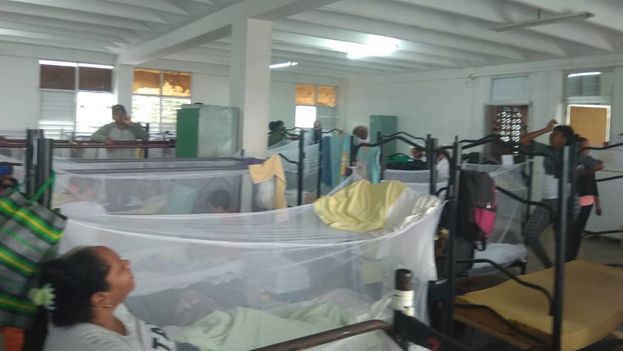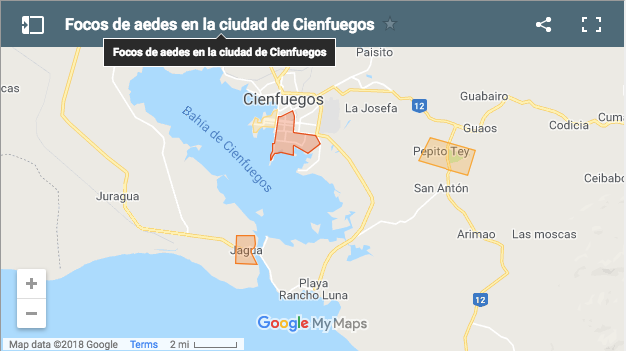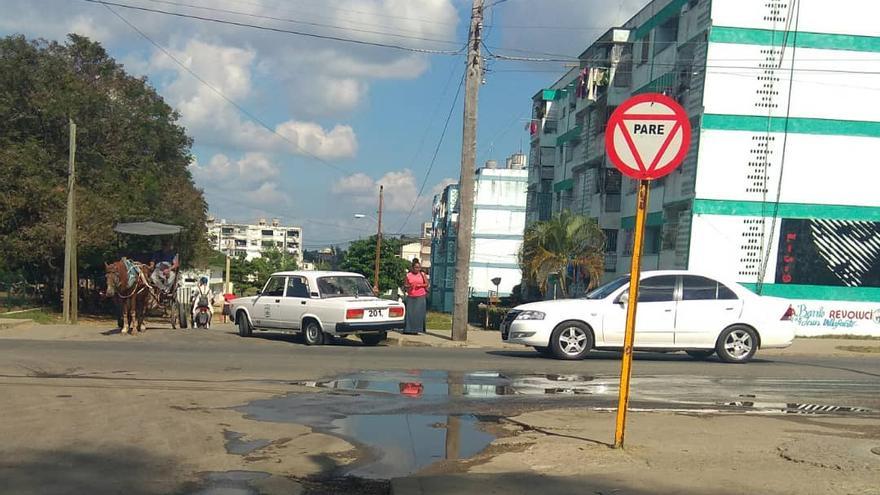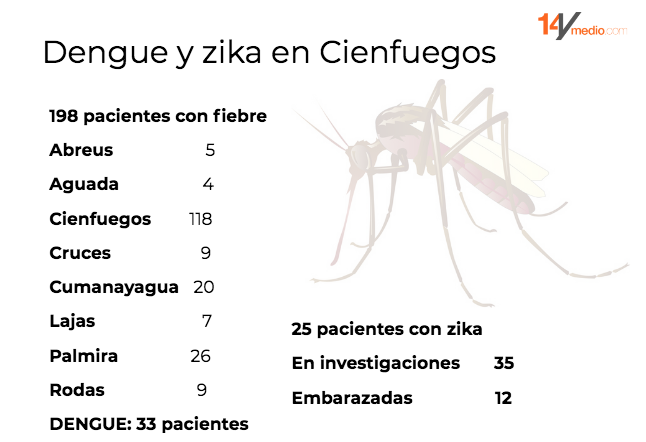
![]() 14ymedio, Justo Mora / Mario J. Pentón, Cienfuegos/Miami, December 12, 2018 –Winter hasn’t managed to contain the Aedes aegypti mosquito, which is grazing freely in Cienfuegos. 198 people have been seen in the past week under suspicion of dengue, and 22 suspected cases of Zika have been recorded, which makes the province one of those most affected by the presence of the mosquito, according to official figures obtained by 14ymedio.
14ymedio, Justo Mora / Mario J. Pentón, Cienfuegos/Miami, December 12, 2018 –Winter hasn’t managed to contain the Aedes aegypti mosquito, which is grazing freely in Cienfuegos. 198 people have been seen in the past week under suspicion of dengue, and 22 suspected cases of Zika have been recorded, which makes the province one of those most affected by the presence of the mosquito, according to official figures obtained by 14ymedio.
“We have around 200 patients with symptoms of having contracted zika or dengue,” one of the doctors directing the fight against the epidemic explained, under condition of anonymity. “Additionally, the confirmed cases in the same period of time are 33 of dengue and 25 of zika. The epidemiologic situation is difficult in the province and the population doesn’t doesn’t realize the risk.”
The most affected municipality is Cienfuegos, with 118 cases of patients with fever, because of which they have had to equip rooms and annex hospitals to attend the flow of patients. In the province, 45 sources of the mosquito Aedes aegypti have been counted, of which the majority, 40, are in the city of Cienfuegos.

The city’s newspaper, 5 de Septiembre, published an article at the end of November warning about the presence of a type of dengue in the province that hadn’t been seen since 1977 and that can cause death.
Authorities classified the health situation in the province at that moment as “alarming.”
“We have some shelters in the Faculty of Medical Sciences, in the Cinco de Septiembre polytechnic, and in other areas like Caunao. We were thinking that in 15 days the situation would be resolved, but to date the outlook remains very complicated,” he added.
The majority of the annexed rooms and shelters in which the patients with fever are being hospitalized don’t have the necessary conditions for good care. The patients are being crowded together, with terrible hygiene conditions and bad food, as 14ymedio was able to confirm during a tour of those spaces. Added to this are a lack of medicine and the bad state of the equipment, some of it in a deplorable condition.

In Cienfuegos there are 25 confirmed cases of zika, a virus that causes the appearance of reddish spots on the skin that may be accompanied by mild fever, headache, conjunctivitis, muscular pains, diarrhea, vomiting, and loss of appetite.
In the case of pregnancies, it is believed that zika can cause microcephaly, because of which health authorities warn pregnant women to avoid traveling to areas where the virus is present. In Cienfuegos, so far there have been confirmed 12 pregnant patients.
“The Aedes mosquito reproduces in clean waters. In Cienfuegos we have a precarious situation with the water supply, so people use tanks, buckets, barrels, and whatever they have on hand so that they don’t run out. There are areas where there has been no water for up to 15 days. This is the perfect place for sources to be generated,” warns the doctor.
“Luckily we have a health system that has its faults, but in coverage is very effective, otherwise, the situation would be worse. Until now we have not had to mourn deaths due to dengue or zika,” he added.

Yamilka Portuondo, a Cienfuegos resident who lives in the Buena Vista neighborhood, doesn’t even remember the mosquito bite, but one morning she woke up with fever and her whole body hurt. “It was as if I had been beaten,” she explains. She spent almost a week with high fevers, abdominal pains, and weakness.
“Late at night is when the mosquitos start to go out and no one can escape them. Here there are many water leaks, that’s where they bred,” she says via telephone.
“I was in bed at home for a week. I had to commit to staying in my room with a mosquito net and not going out*. My dengue wasn’t the worst case, because of that a doctor friend of mine let me stay at home, but the majority of people have to go to the hospital,” she comments.
Her family got meat, oil, and vegetables for her diet, a luxury for the poorly supplied local markets. “My family members in Miami sent me a package of food that also helped. Dengue makes the platelets go down a lot, so doctors order a reinforced diet. Without my family I don’t know what I would have done.”
*Translator’s note: Patients can become a link in the transmission chain if uninfected mosquitos bite them, catch the virus, and then pass it on by biting other people.
Translated by: Sheilagh Carey
____________________
The 14ymedio team is committed to serious journalism that reflects the reality of deep Cuba. Thank you for joining us on this long road. We invite you to continue supporting us, but this time by becoming a member of 14ymedio. Together we can continue to transform journalism in Cuba.
